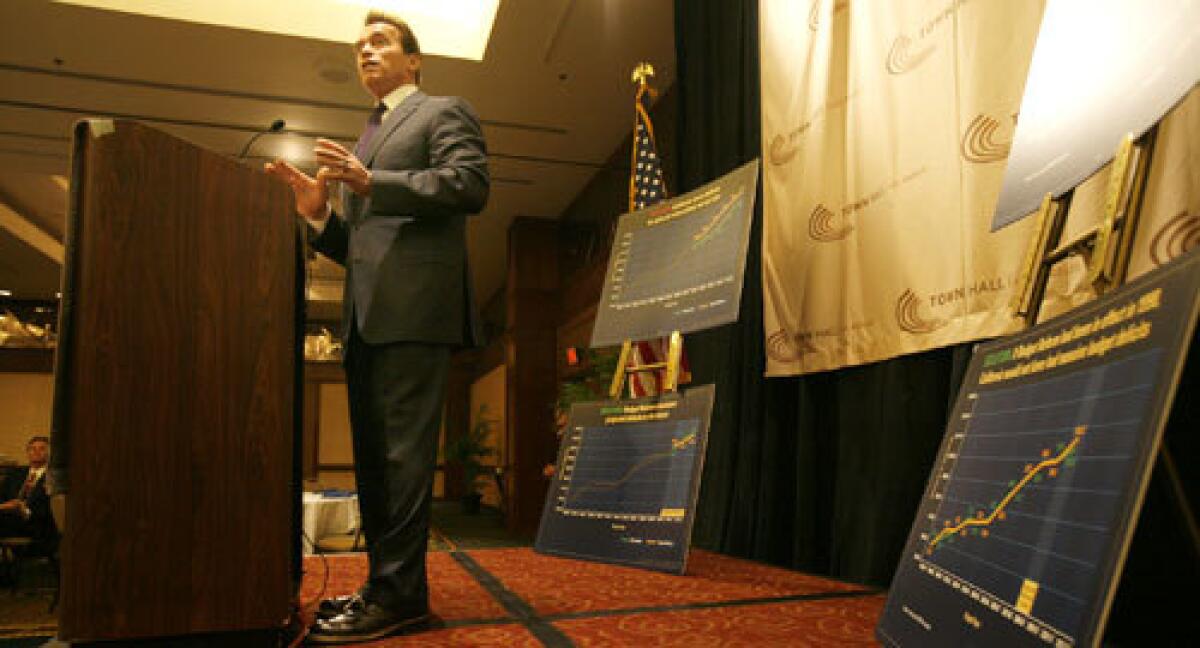Schwarzenegger wants to close some ‘tax loopholes’

- Share via
Gov. Arnold Schwarzenegger eased his long-held opposition to more taxes Thursday, saying some of California’s $16-billion budget gap could be erased by reducing or eliminating billions of dollars in state tax breaks for businesses and individuals.
Addressing a community forum at a breakfast in downtown Los Angeles, the governor said he would like to raise as much as $2.5 billion in new revenue by closing “tax loopholes.” Schwarzenegger said the money could be used to offset some of his proposed $4.4 billion in school cuts, which educators say would lead to teacher layoffs and larger classes.
The governor endorsed the framework of a spending plan put forward last week by the Legislature’s chief budget analyst as an alternative to Schwarzenegger’s fiscal blueprint, which addresses the state’s deficit mostly with cuts and borrowing.
Legislative Analyst Elizabeth G. Hill in her plan called on lawmakers to limit cuts to state programs by scaling back tax breaks for seniors, parents, yacht owners and companies that have research-and-development expenses, locate in blighted neighborhoods or lose money.
Schwarzenegger said he did not necessarily support eliminating the specific write-offs and credits that Hill proposed, but he would like to raise more than $2 billion by going after tax breaks.
“I am a big believer that when we have a financial crisis like this, we all should chip in,” he said. “This why I totally agree with the Legislative Analyst’s Office when she says we should look at tax loopholes. . . . We should go after those tax loopholes. We need the extra $2.5 billion. This is $2.5 billion we could give straight to education. I am totally for that. We should go for it, and we should do it because everyone has to give something in order to make this work.”
His remarks were not well received by GOP lawmakers and anti-tax activists, some of whom said the governor was breaking his pledge not to raise taxes.
“If that is what he is saying, then we have a real problem,” said Jon Coupal, president of the Howard Jarvis Taxpayers Assn. “It is a fairly direct breaking of his no-new-taxes pledge. How do you dance around that?”
Coupal said rolling back tax credits and other deductions would raise tax bills for millions of Californians. It has the same effect as a broad-based tax hike, he said.
Assembly Budget Committee Vice Chairman Roger Niello (R-Fair Oaks) agreed. He said that those advocating a repeal of tax breaks have misled the public into believing that big money can be saved by targeting schemes enjoyed by the rich alone, such as the one that allows wealthy yacht, airplane and luxury RV owners to avoid sales taxes by keeping their new purchases out of state for 90 days.
But that tax break amounts to only $26 million a year, Niello said. The governor is talking about raising billions.
“People use the term ‘loophole’ and refer to the yacht tax,” he said. “It is one heck of a lot of things other than the yacht tax.”
Niello said raising $2.5 billion would require the state to roll back credits and write-offs used by millions of taxpayers, affecting California’s large middle class and damaging the state’s business climate.
The Democrats who control the Legislature, however, embraced the governor’s call to bring in new revenue by closing some loopholes.
“The governor’s comments are recognition that this problem is very serious and it requires a variety of options,” said Sen. Darrell Steinberg (D-Sacramento), who will take over leadership of the state Senate this year. “His legacy will no doubt be tied to successfully resolving this budget crisis. He realizes we will not be able to invest in other areas, like healthcare and education, until we have budget stability.”
Schwarzenegger and Democrats cannot eliminate tax breaks on their own. Doing so requires at least eight GOP votes in the Legislature. Republican leaders say those votes will not be available.
But Schwarzenegger expressed optimism that as budget negotiations lumber toward the July 1 deadline for putting a new spending plan in place, things will change.
“What will happen in these next few weeks and months is Democrats and Republicans will sit down and start talking about it,” he said Thursday morning.
“They will be looking at it and saying to themselves, ‘Look, there are only so many cuts we can make.’ . . . There are a lot of people who believe, the same as I do, that we should protect education. . . . So everyone will recognize out of the $16 billion in cuts that have to be made, you know, why not go also and find a way of creating some revenues?”
So far, lawmakers and the governor have managed to cut only roughly $2 billion from the budget.
The rest of the actions they have taken to pare the shortfall have been limited to borrowing, delays and deferrals -- moves that have temporarily freed some cash to keep the state from running out of money altogether, but do nothing to fix the chronic imbalance in the budget and will ultimately have to be repaid.
The limited cuts lawmakers did make were targeted at schools and doctors for the poor and triggered protests across the state.
molly.hennessy-fiske@
latimes.com
More to Read
Sign up for Essential California
The most important California stories and recommendations in your inbox every morning.
You may occasionally receive promotional content from the Los Angeles Times.














